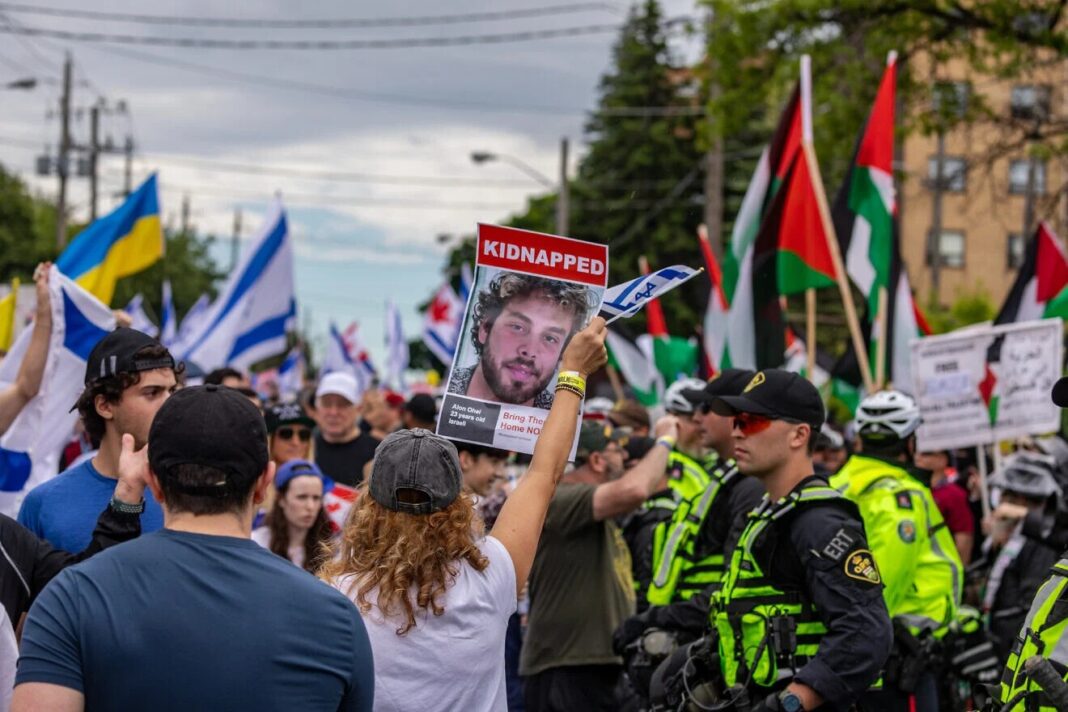|
Getting your Trinity Audio player ready...
|
(JNS) The Toronto Police Service spent about $14 million—some 20 million Canadian dollars—in 2024 to maintain security at protests connected to Israel’s war against the Hamas terror group, according to an official report slated to be presented to the police department’s board, CTV News reported.
Police officers responded to more than 2,000 “unplanned events,” and about 40% of the money spent on security went to costs like overtime and call-back pay, per the report.
“Inaction endangers Torontonians and costs us money. Because our so-called ‘leaders’ have refused to act to uphold the law, nearly $20 million of our hard-earned tax dollars has been wasted policing hate rallies,” stated the Canadian parliamentarian Kevin Vuong, who represents a downtown Toronto district. “The people of Toronto deserve better.”
Talia Klein Leighton, president of Canadian Women Against Antisemitism, told JNS that the expenses were “insane” and “absolutely avoidable.”
“When the protests first started on Oct. 8 in downtown Toronto, if the Toronto police had cracked down and used the laws that exist against unlawful assembly, against masking, and if they would have laid charges against disseminating hate and against advocating for genocide of the Jewish people, then they would have stopped these rallies in their tracks before they got so entrenched,” she told JNS.
Police could have sent a message “that this is not what goes on in the streets of Toronto. This is not how Torontonians conduct themselves,” Klein Leighton said. “Then it would have been completely avoidable. Instead, if anything, they’ve almost helped to enable these rallies.”
Guidy Mamann, president of the Toronto Zionist Council, has co-run a weekly, pro-Israel rally in an area with one of Canada’s largest Jewish populations since October 2023. He told JNS that he is “shocked by how much money it takes to protect our community from haters.”
“I’m appalled,” he said.
His weekly gatherings, which he said are peaceful, regularly face hateful responses. “The police come with such a force, incredible manpower, not at my request but because they believe it’s necessary,” he said.
“We’re not in neighborhoods that are heavily populated by Palestinians or Arabs or Muslims or anything like that,” he told JNS. “We are right in the heart of the Jewish community, minding our own business, speaking really to our own community and trying to give them a sense of pride and comfort.”
The cost is “a dollar amount corresponding to how much hate there is out there against us,” Mamann said.
Aaron Hadida, director of the volunteer Jewish security patrol Magen Herut, comes to the pro-Israel rally each week with his team. (Magen Herut has also provided security for heads of state and high-profile celebrities at local events.)
“The first thing that goes through my mind is ‘appalling.’ Many police resources have to be deployed for events that really, for the most part, should not be allowed to take place,” he told JNS.
“Most of them are hate fests with masked individuals with symbols of terrorist organizations,” he said. “I just think it’s such a waste of valuable resources, and it’s protest after protest after protest. Now it’s just become a game to them.”
Like Klein Leighton, Hadida believes that an early crackdown on the protests “would set an example” and would not “open the door to 1,000 more protests.”
But in recent weeks, “something has shifted,” and police officers are actually arresting people, he said.
“My opinion is that you have the right to demonstrate and rally and protest, but if it requires that the city send police protection or have a police presence, you should be billed,” he said.
“Let’s see how many protests they would do if they got an invoice from the police, and believe me, it’ll stop real quick,” Hadida said.
James Pasternak, a member of the Toronto City Council whose district covers the area of the weekly pro-Israel rallies, told JNS that “this is a shockingly high allocation of police resources.”
“We have very thin police services and they should be available to respond to traditional law enforcement issues, such as robberies, assaults, shootings and stabbings,” he said. “We have had a complete societal failure in dealing with these mobs, most of which are not charter protected.”
“They don’t have permits. They don’t pay fees, and they violate numerous laws and bylaws,” Pasternak said. “It is crucial police services enforce current laws, and the city of Toronto develop a protest policy that ensures this endless destabilizing force cannot occur without consequences.”





